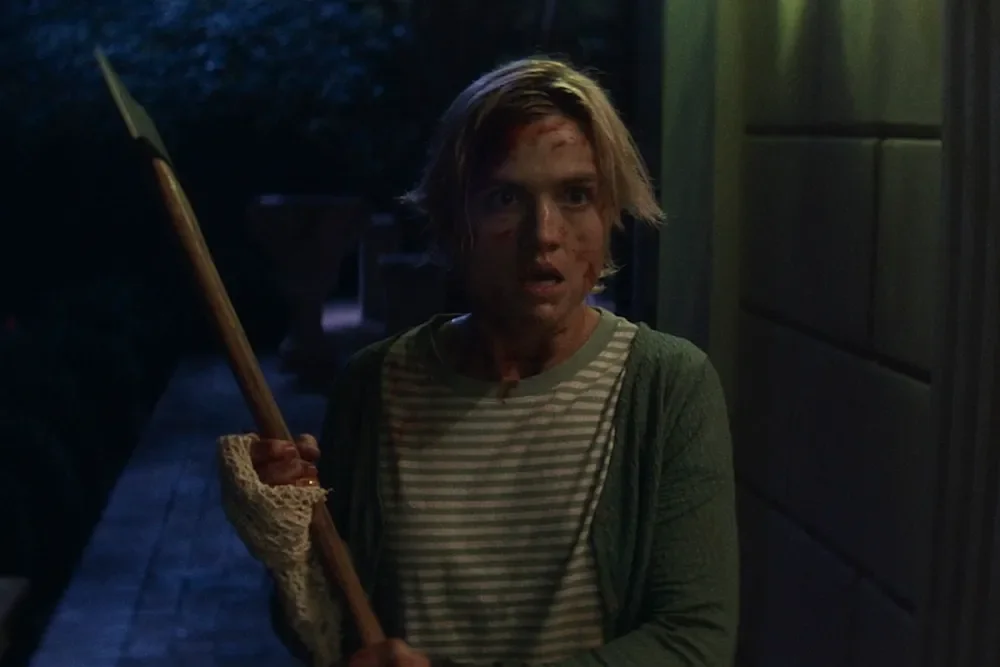Thank God the director of “Anemone” has a talented dad
Directed by Ronan Day-Lewis
Written by Ronan Day-Lewis and Daniel Day-Lewis
Starring Daniel Day-Lewis, Sean Bean, and Samantha Morton
Anemone begins simply, with a man leaving his family to go visit his brother in his remote forest cabin. Throughout the film’s opening, there’s not much more than that: one lead sitting around, the other hiking his way ltowards him. The intent is clear—our main character is a man of solitude—but for such a simple takeaway, things become almost parodically stretched out before too long. Even once the characters meet, the pace doesn’t pick up; much of what follows takes place without dialogue. First-time director Ronan Day-Lewis is clearly trying to show us that these men share their own rhythm, one they don’t need words to resume, but we don’t know anything about these people individually, and these endless dialogue-free stretches only communicate the barest essentials of their bond. Despite aspirations to visual storytelling, it comes off as directorially self-conscious, a self-imposed restriction from Day-Lewis rather than a story-based necessity. Anemone wants to be seen as Art, a landmark first outing of a bold new auteur, but in its opening twenty-five minutes, it carries only the surface level signifiers of that ambition. Hell, it even stands on ceremony when it comes to showing you its lead actor’s face.
Unfortunately for anyone hoping to write it off as an ego-driven misfire, when Anemone does finally show you its lead, it’s Daniel Day-Lewis, back in the saddle for the first time since 2017’s Phantom Thread. As ever, it is a pleasure to watch him work, and to say he elevates his son’s feature directorial debut may be the cinematic understatement of the year. This is the elder Day-Lewis in full animal mode, like Bill the Butcher or Daniel Plainview if their lives had gone sad(der than they did in their actual movies). Everything that works about his performances here and across his career is exemplified in two ten-plus minute monologues, the first full of bravado and self-serving fiction, the other truthful and broken. It is an occasionally flooring reminder of how he gained the reputation he now holds.
With the introduction of Ray (Day-Lewis) comes an actually interesting version of Anemone’s story, as well. His brother, Jem (Sean Bean, Deep Cover), has come to try to bring him back to the world to reunite him with his estranged son, Brian, who is in danger of following in his father’s damaged footsteps. A psychological battle of hardheaded brothers ensues, with a young man’s future hanging in the balance. It’s far from novel, but there’s real heart to it, powered not just by Daniel Day-Lewis as Ray but by Samuel Bottomley (How to Have Sex) as Brian, who communicates his character’s deep sorrow in a way that immediately recalls the legend playing his father. From there, the script by both Day-Lewises spins a story of the legacy of violence, passed down by blood and history. The Troubles feature heavily, and we see how the conflict shattered people like Ray and left them unable to relate to those around them, like they’re watching conversations from the other side of glass. It recasts those earlier scenes, drawn out as they are, to be about communication between loved ones where words blessedly aren’t needed. It still progresses slowly, but there’s skill to the Anemone’s unfurling of its lead and to Ronan Day-Lewis’s visuals, which stay true to his background as a painter and are striking when they’re not overwrought.
Sadly, the younger Day-Lewis eventually reasserts his artistic ego in the third act, which draws on Magnolia and veers randomly into expressionist imagery after remaining grounded for the first two acts. The only real precedent to what transpires there is the camera dollying backward in one scene to reveal the brothers in a dollhouse version of Ray’s cabin or the clouds moving slightly too fast to feel natural, minute compared to the way the characters’ interiority suddenly begins affecting the world around them. That’s far from the only problem. Ray’s final monologue is the emotional climax of the thing, yet Ronan keeps on trucking forward, giving us a far more classic, needless climax of fisticuffs before ending in a place that may have been better left implied. Certainly, his father’s performance had already done so. It’s rare to see a movie where you want this badly to step through the screen to tell the director to stand aside and let Daddy work. It lives in his shadow, after all, and parts of it die there, as well.
Rating: B-
Anemone is now playing in limited release. It will expand wide on October 10. You can watch the trailer here.






